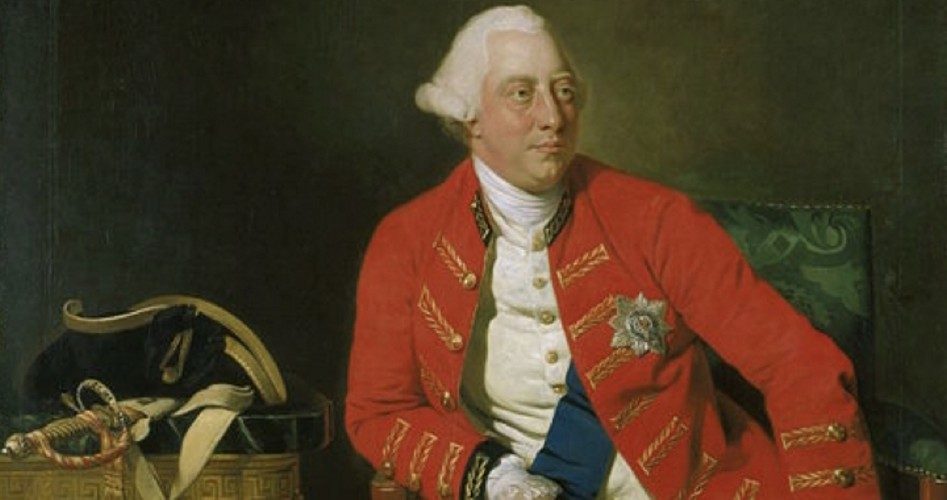
“His Brittanic Majesty acknowledges the said United States, viz., New Hampshire, Massachusetts Bay, Rhode Island and Providence Plantations, Connecticut, New York, New Jersey, Pennsylvania, Delaware, Maryland, Virginia, North Carolina, South Carolina and Georgia, to be free sovereign and Independent States.”
That is the first clause of Article 1 of the Treaty of Paris, the agreement ending hostilities between Great Britain and the United States, signed on September 3, 1783.
While the end of an eight-year war, a war that restored self-government to the 13 American states is worthy of celebration, there are a few words in the clause quoted above that are especially worthy of remembrance: “free sovereign and Independent.”
Later, in Article 1, George III reaffirms that not only are his former colonies “free sovereign and independent,” but he vows from that day forward to “treat with them as such.”
Notice, moreover, he is not signing a treaty with one nation; he is signing a treaty with 13 nations, each of which is listed at the beginning of Article 1.
Further down in this historic agreement, the representatives of George III and the representatives of Congress agree that “Congress shall earnestly recommend it to the Legislatures of the respective States to provide for the Restitution of all Estates, Rights, and Properties, which have been confiscated belonging to real British Subjects.”
Again, pay close attention to the relative status of the Congress of the United States and the legislatures of the respective states comprising that confederation.
Congress is not tasked with telling the states to restore the property of British subjects confiscated during the war. Congress is required to “earnestly recommend” a course of action to the 13 state governments. Think about what that reveals about the relative power of Congress and the state legislatures. If Congress were superior to the state legislatures, then the treaty would simply have enjoined Congress to inform the states that it — the Congress — would be returning to British subjects the property seized from them during the War for Independence. George III, his representatives, and the representatives of the Congress knew that Congress did not have that authority and that such an act would be up to the free, sovereign, and independent states to execute, or not.
Next, in Article 7 peace is explicitly declared between “his Britannic Majesty and the said states.” The states are now at peace with Britain, if Congress is able to convince the state legislatures to agree to the terms.
The final clause of Article 7 of the Treaty of Paris commits all official documents, deeds, and papers that may have been confiscated by the British army or agents of the British government to be “forthwith restored and delivered to the proper States and Persons to whom they belong.”
You see? Those things weren’t to be delivered to Congress or to some U.S. government official. These items were to be returned to the states from where they were seized or the individuals to whom the items rightfully belonged.
Yet another of the provisions of this peace treaty illuminating the proper relationship and relative roles of the governments of the states and the Congress!
Next, in several articles of the Treaty of Paris (there are 10 total) the people native to Great Britain are called “subjects,” while the people of the several states are called “citizens.” This may seem an insignificant and perhaps legalistic distinction, but it is not. The difference between those two conditions is vast and worth noting. Here is the essence of the distinction as described by historian David Ramsay:
Subjects look up to a master, but citizens are so far equal, that none have hereditary rights superior to others. Each citizen of a free state contains, within himself, by nature and the constitution, as much of the common sovereignty as another. In the eye of reason and philosophy, the political condition of citizens is more exalted than that of noblemen. Dukes and earls are the creatures of kings, and may be made by them at pleasure: but citizens possess in their own right original sovereignty.
Finally, it is valuable to recall that the language of the Treaty of Paris wherein the 13 states are recognized as fully functioning, free, and sovereign entities is substantially similar to the language of the Declaration of Independence, the document that formalized the state of war that had existed since April 19, 1775 when “the shot heard ’round the world” was fired on Lexington Green.
The Declaration of Independence affirms in clear and unmistakable terms:
That these United Colonies are, and of Right ought to be Free and Independent States; that they are Absolved from all Allegiance to the British Crown, and that all political connection between them and the State of Great Britain, is and ought to be totally dissolved; and that as Free and Independent States, they have full Power to levy War, conclude Peace, contract Alliances, establish Commerce, and to do all other Acts and Things which Independent States may of right do.
In 2020, some 237 years after the Treaty of Paris effectively ended the War for Independence, it is sad that we don’t know as much about the concept of federalism and the relationship it creates among the government of the United States and the governments of the several states that comprise that union.
Image of King George III: Screenshot from Wikimedia
Joe Wolverton II, J.D., is the author of the book The Real James Madison, What Degree of Madness: Madison’s Method to Make America STATES Again, and The Founders Recipe. He hosts the popular YouTube channel “Teacher of Liberty” and the podcast of the same name.



